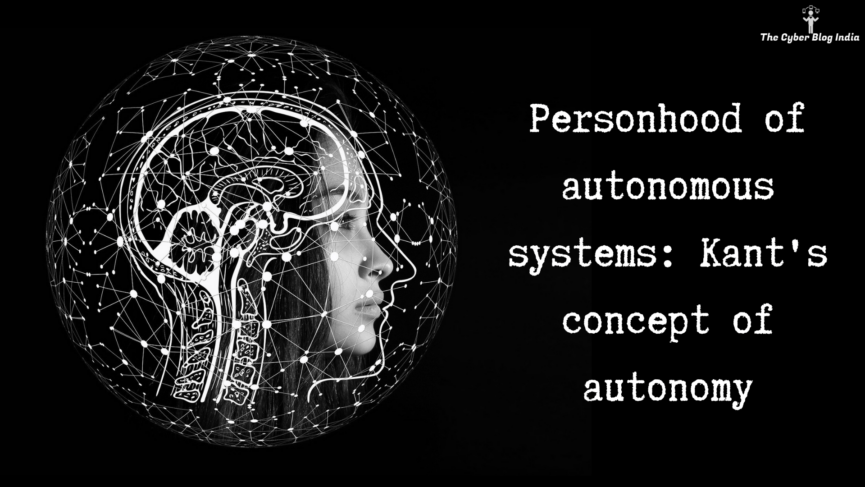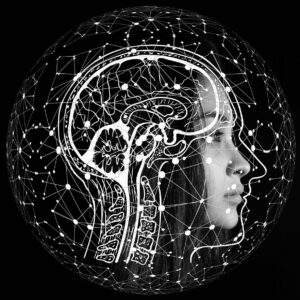Personhood of autonomous systems: Kant’s concept of autonomy

In the first article of this series , we briefly explored autonomy from various perspectives such as legal, technological, and philosophical. It lays down the groundwork for our discussions to follow in the upcoming articles of this series on the personhood of autonomous systems. This article is an attempt to understand Kant’s concept of autonomy in the context of autonomous systems. In the words of Kant himself,
, we briefly explored autonomy from various perspectives such as legal, technological, and philosophical. It lays down the groundwork for our discussions to follow in the upcoming articles of this series on the personhood of autonomous systems. This article is an attempt to understand Kant’s concept of autonomy in the context of autonomous systems. In the words of Kant himself,
“Autonomy of the will is the sole principle of all moral laws, and of all duties which confirm to them.”
Kant’s concept of autonomy
Kant defines free actions as per the will of an agent. This definition brings a natural distinction between spontaneous and unrestrained actions of an agent (Kant, 2017). According to him, autonomy plays a vital role in the biographies of individuals, public policy, political ideologies, and moral responsibilities. Autonomy is not liberation from legislation, rather the freedom to be enslaved. Autonomy is the basis of Kant’s views on logical reasoning and is closely associated with morality (Korsgaard, 1996).
Foundation of moral responsibility and mutual respect relies on the self-infliction of global legislations related to morality. Kant believes that freedom is extrinsic to our decisions or will. The self-infliction of such legislations based on morality is what he terms as autonomy. He strongly believed that autonomy is crucial to fathom the control of morality on individuals (Hill, 1989). Or in other words, autonomy lies at the core of the theory of morality. Autonomy involves the imposition of legislations upon ourselves and their conclusive authority upon us.
The logical decision theory states that a will functions by acknowledging the reasons. A will operated by the function of natural laws cannot be construed to be functioning by acknowledging the logical reasons. Kant has focussed more on the autonomy of will, instead of personal autonomy. The autonomy of will motivates individuals to make and accept principles, essentially resulting in exclusive and broader freedom of society (Wood, 2007).

Core Elements of Kantian Ethics (Adopted from Ulgen (2017))
Kant’s theory: Criticism and supporting views
Commentators like Anscombe have labelled Kant’s theory as absurd. She claims that Kant’s theory necessitates higher authority for lawmakers. She states that the law has binding power, and it can make individuals comply even if they are resistant to do a certain act (Anscombe, 1981). According to her, Kant does not comprehend the ideology of compliance, and hence, his theory is completely irrational (Wilson, 2009).
On the other hand, Tyler believes that legislations are conformed by the citizens, not just out of fear but out of respect. He supported Kant’s theory by contending that his concept of morality is an analogy demonstrating a version of ourselves (Tyler, 2006).
Similarly, Allison redeems the logical explanation of Kant and believes that Kant respects the principles of logical reasoning. An agent with absolute freedom can act and think logically for any purpose that surpasses their belief for working for their contentment only. Allison believes that the idea of everyone acting similarly is instrumental in the justification of Kant’s interpretation (Allison, 1986).
Kant’s theory and artificial intelligence
Kant has argued that logic is the only touchstone that accords autonomy status to human beings. It is reasonable to presume that he would hold a similar view of autonomous systems. If Kant’s principles are followed, the autonomy of machines can be established theoretically. From his perspective, the logical understanding of human beings is connected to capability; instead of real control of logics (Simon, 1982). Technologies present in autonomous systems can be presumed to develop rationality, provided they indulge in logical reasoning and take subsequent actions.
Kant gives more importance to the rational capacity of human beings; instead of possessing rationality. He also takes into account the deficiency of morality and immoral content; where humans may irrationally for gaining an advantage over their opponent (White, 2018). Even though Kant’s concept is specifically reserved for human beings and their capability to set up a system for governing moral conduct, artificial intelligence as a technology may have this potential; instead of actual human rational thinking (Smithers, 1997). This approach sounds promising; but at the same time, it raises concerns about certainty and predictability of technology in real-world scenarios.
When it boils down to machines vs. humans, there is a clear distinction between machine’s logic and human wisdom.
Machines may outperform human beings in a certain set of tasks due to faster processing of data. However, they lack deliberation and sentiments which are necessary for human reasoning in situations where autonomous systems are supposed to take over. Further, they lack the complex cognitive ability present in humans to appraise an ongoing situation, exercise judgement, take a certain action, refrain from an exaggerated action, or limit harm to other parties (Lieblich & Benvenisti, 2016). Autonomous systems do not have an inherent ability to stop a particular action at the last minute or lookout for a workable alternative like human beings.
Ending notes
At the end of the day, Kant would be concerned about the certainty and uniformity of such machines in real-life situations. Without a doubt, machines can perform faster peripheral processing based on calculative analysis, data classification, and well-defined actions. In mechanical logics, machines might surpass human beings. However, they would be devoid of consciousness and contemplative approach of human logic. For example, human judgement plays a crucial role in wars to avoid incessant damage and take appropriate measures after assessing the gravity of an ongoing situation. Robots, or autonomous systems in general, are do not have psychological capabilities to examine and execute decisions in critical situations. Autonomous systems do not have impulsive capabilities to backtrack their actions at the last moment. Hence, we need a more lucid perspective to understand the logical aspects of such systems and their applications.
Interested in contributing to our blog and knowledge base? Write to us at contact@cyberblogindia.in and elaborate on how you can help us in creating a safer cyber space.
Featured Image Credits: Image by Gerd Altmann from Pixabay
References
Allison, H., 1986. Morality and Freedom: Kant’s Reciprocity Thesis. The Philosophical Review, 95(3), pp. 393-425.
Anscombe, G., 1981. Modern Moral Philosophy. In: The Collected Philosophical Papers of G.E.M. Anscombe, Volume 3: Ethics, Religion, and Politics.
Hill, T., 1989. The Kantian conception of autonomy. In: J. Christman, ed. The Inner Citadel: Essays on Individual Autonomy. Oxford, U.K.: Oxford University Press, pp. 91-105.
Kant, I., 1998. Grounding for the Metaphysics of Morals. Cambridge, U.K.: Cambridge University Press.
Korsgaard, C., 1996. The Sources of Normativity. 2nd ed. Cambridge, U.K.: Cambridge University Press.
Lieblich, E. & Benvenisti, E., 2016. The obligation to exercise discretion in warfare: why autonomous weapons are unlawful. Autonomous Weapon Systems, Law, Ethics, and Policy.
Simon, H., 1982. Models of Bounded Rationality, Volume 1: Economic Analysis and Public Policy. 1st ed. Cambridge, MA: MIT Press.
Smithers, T., 1997. Autonomy in robots and other agents. Brain and Cognition, 34(1), pp. 88-106.
Tyler, T., 2006. Why people obey the law. Princeton: Princeton University Press.
Ulgen, O., 2017. Kantian Ethics in the Age of Artificial Intelligence and Robotics. QIL, Volume 43, pp. 59-83.
White, J., 2018. Autonomous Reboot: the challenges of artificial moral agency and the ends of Machine Ethics.
Wilson, E., 2009. Is Kant’s Concept of Autonomy Absurd?. History of Philosophy Quarterly, 26(2), pp. 159-174.
Wood, A., 2007. Kantian Ethics. 1st ed. Cambridge, U.K.: Cambridge University Press.
